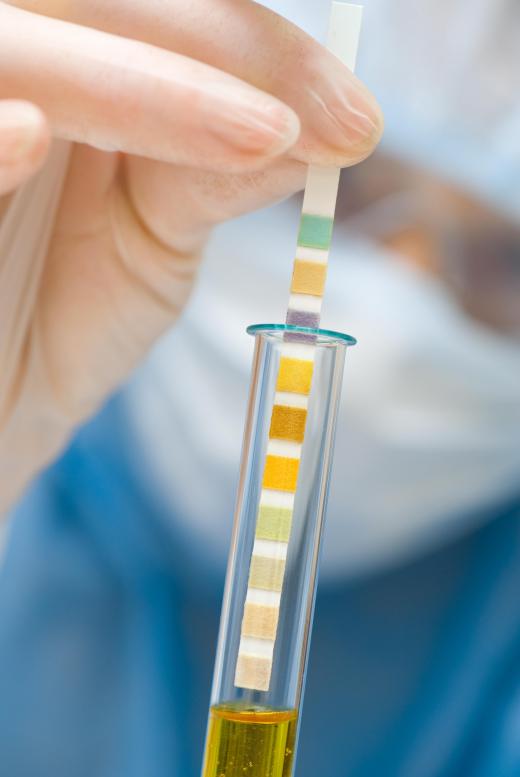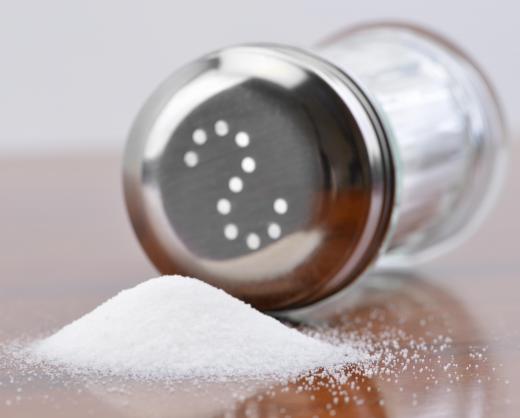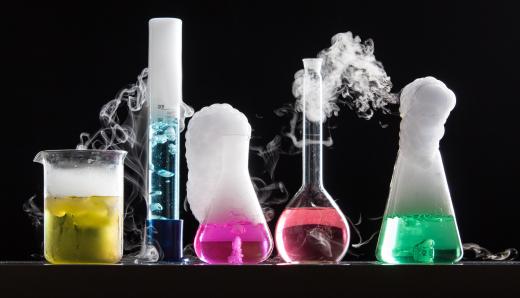In Chemistry, What Is Neutralization?
Neutralization is the process by which an acid and base combine to form water and a salt. This occurs because some chemicals displace each other based on the reactivity series. For example, in the reaction of hydrochloric acid and sodium hydroxide, the sodium displaces the hydrogen and bonds with the chloride ion in the acid. This forms sodium chloride, commonly known as table salt. The leftover hydrogen and oxygen ions form water, thus removing the acidic and basic properties they previously held.
Some chemical compounds can be classified as acids or bases. This is measured by their position on the pH scale, with 1 being a strong acid and 14 being a strong base. Common acids are compounds such as hydrochloric acid, carbonic acid, and nitric acid. Some common bases are compounds such as sodium hydroxide, potassium hydroxide, and ammonia. Acids are commonly found in food ingredients such as lemons, vinegar, and grapefruits.

The basic process of neutralization can be understood if acids and bases are thought of as opposites. If an acid, with a pH of 1, reacts with a base, with a pH of 14, the logical product is something with a pH in the middle of those two numbers, such as 7. This is the neutral point on the pH scale. Technically speaking, this reaction is referred to as a double displacement reaction. The specific reason for this neutralization is related to the reactivity series.

Different chemicals can have different levels of reactivity, which is charted by the reactivity series. Essentially, any element further up the reactivity series is more reactive than any chemical lower down the series. This means that if they are put in a solution together, the more reactive element will be able to steal the place of the less reactive element, in a process known as displacement. This displacement is important to the process of neutralization.

A common neutralization reaction is when hydrochloric acid reacts with sodium hydroxide to form sodium chloride and water. The sodium, a very reactive metal, displaces the hydrogen in the hydrochloric acid and forms a bond with the chlorine to make salt. This leaves two hydrogen atoms and one oxygen atom, which then bond to make water. The acidic and basic properties of the hydrogen and hydroxide are neutralized because of the change in the chemicals they are bonded with.
Any neutralization reaction between a strong acid and a base produces water and salt in this way. Water is always a product, because hydrogen is always part of an acid and oxygen is usually a component of the base. Different salts are formed according to the different chemicals in the reaction. Salts are any ionic compounds with a positive ion other than hydrogen and a negative ion other than hydroxide. Sometimes, if equal strength acids and bases aren’t used, a neutralization reaction can form a slightly acidic or basic product.
AS FEATURED ON:
AS FEATURED ON:













Discussion Comments
I always find that a lot of my friends don't like chemistry because of how "difficult" it is. There's no doubt that it's a very complex subject, but it's all the more rewarding. You get to learn about a bunch of different experiments, and how things work in a laboratory. Who doesn't love cutting open animals and looking at their insides? It might be something that doesn't interest everyone, but chemistry is something that everyone should give a shot.
@RoyalSpyder - My best advice to you would be to get a tutor. I'm definitely not saying that you should take advantage of the tutor, but they'll really help you out. Last year, I took a physics class, and it was pretty difficult. My professor moved way too fast in the lectures. However, the very next week, I sought help, and I had a tutor who helped me throughout the entire semester. Whenever you're struggling in a class, always remember to seek outside help.
Does anyone find chemistry to be a really confusing subject? I remember taking a course in my high school, and was surprised at how tough it is. There was always a lot of math involved, and I generally didn't understand a thing that was going on. Does anyone have some advice on how to handle chemistry in the future? I'm in college now, and I'll be required to take it next semester. Obviously, it's going to be even more complex than it was in high school. Any tips?
Post your comments